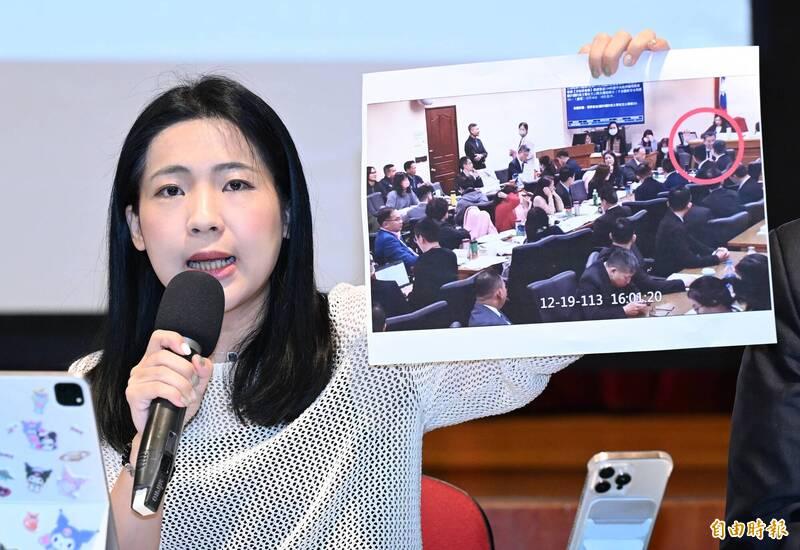President William Lai’s (賴清德) latest speech was not fact-based and included rumors, Chinese Nationalist Party (KMT) Legislator Hsu Chiao-hsin (徐巧芯) said today.
In Taipei last night, Lai delivered his fourth speech in a series of 10, focusing on national security and supporting the military.
Hsu, who was speaking at a news conference hosted by former Broadcasting Corp of China chairman Jaw Shaw-kong (趙少康), called Lai out on his statements about several military budget issues.

Photo: Liao Chen-huei, Taipei Times
While Lai said that the budget for the Chiayi County drone project was frozen, the Legislative Yuan’s Foreign Affairs and National Defense Committee has already unfrozen it, Hsu said.
As for the domestic submarine project, the budget has never been frozen or cut; it was only subject to more oversight, Hsu said.
“How can the commander of our armed forces continue to spread false news?” Hsu asked.
While Lai said the budget for the Hai Kun (海鯤), or “Narwhal,” was frozen, it is pending the indigenous defense submarine prototype passing its ongoing tests, Hsu said.
The budget for the submarine is still there and can be used after testing, which is is a positive measure, she added.
Lai is spreading fake news, as it is the responsibility of legislators to safeguard the armed forces, Hsu said.
Minister of National Defense Wellington Koo (顧立雄) promised that the budget for subsequent submarines would not be used until the Hai Kun completes its tests, she said.
Responding to Lai’s statement that the national defense budget freeze and cuts were the largest in history, Hsu said that 97 percent of the cuts came from one drone project.
The budget was cut by NT$4.68 billion (US$160.41 million), NT$4.57 billion of which was for the drone project, she said.
It had a pricing error that saw its cost estimate rise from between NT$5.5 billion and NT$6 billion to NT$11.5 billion, leading to the extra portion being deleted, she said.
Among those who voted for the cut was Democratic Progressive Party Legislator Wang Ting-yu (王定宇), who is the committee’s convener and ended up being the deciding vote, Hsu said.

The Central Weather Administration (CWA) today issued a "tsunami watch" alert after a magnitude 8.7 earthquake struck off the Kamchatka Peninsula in northeastern Russia earlier in the morning. The quake struck off the east coast of the Kamchatka Peninsula at 7:25am (Taiwan time) at a depth of about 19km, the CWA said, citing figures from the Pacific Tsunami Warning Center. The CWA's Seismological Center said preliminary assessments indicate that a tsunami could reach Taiwan's coastal areas by 1:18pm today. The CWA urged residents along the coast to stay alert and take necessary precautions as waves as high as 1m could hit the southeastern

The National Museum of Taiwan Literature is next month to hold an exhibition in Osaka, Japan, showcasing the rich and unique history of Taiwanese folklore and literature. The exhibition, which is to run from Aug. 10 to Aug. 20 at the city’s Central Public Hall, is part of the “We Taiwan” at Expo 2025 series, highlighting Taiwan’s cultural ties with the international community, National Museum of Taiwan Literature director Chen Ying-fang (陳瑩芳) said. Folklore and literature, among Taiwan’s richest cultural heritages, naturally deserve a central place in the global dialogue, Chen said. Taiwan’s folklore would be immediately apparent at the entrance of the

“China is preparing to invade Taiwan,” Deputy Minister of Foreign Affairs Francois Wu (吳志中) said in an exclusive interview with British media channel Sky News for a special report titled, “Is Taiwan ready for a Chinese invasion?” the Ministry of Foreign Affairs said today in a statement. The 25-minute-long special report by Helen Ann-Smith released yesterday saw Sky News travel to Penghu, Taoyuan and Taipei to discuss the possibility of a Chinese invasion and how Taiwan is preparing for an attack. The film observed emergency response drills, interviewed baseball fans at the Taipei Dome on their views of US President

Speeding and badly maintained roads were the main causes of a school bus accident on a rainy day in Taipei last year that severely injured two people and left 22 with minor injuries, the Taiwan Transportation and Safety Board said. On March 11 last year, a Kang Chiao International School bus overturned inside the Wenshan Tunnel (文山隧道) on the northbound lane of the Xinyi Expressway. The tour bus, owned by Long Lai Co, exceeded the speed limit after entering the tunnel, the board’s investigation found. Sensing that the rear of the vehicle was swaying, the driver attempted to use the service and exhaust